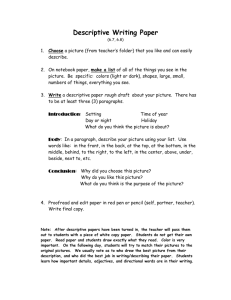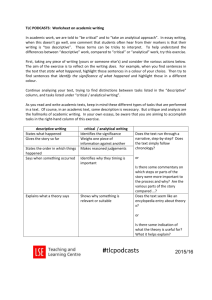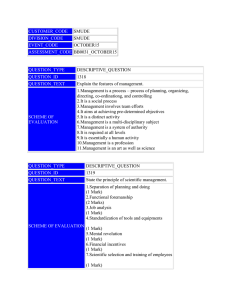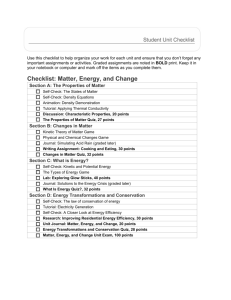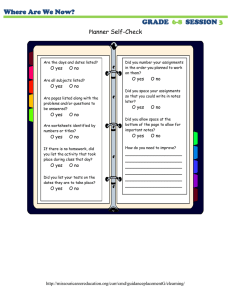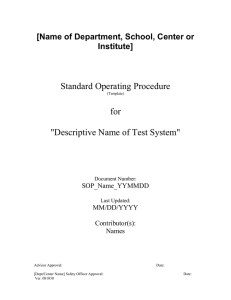Document 11039632
advertisement
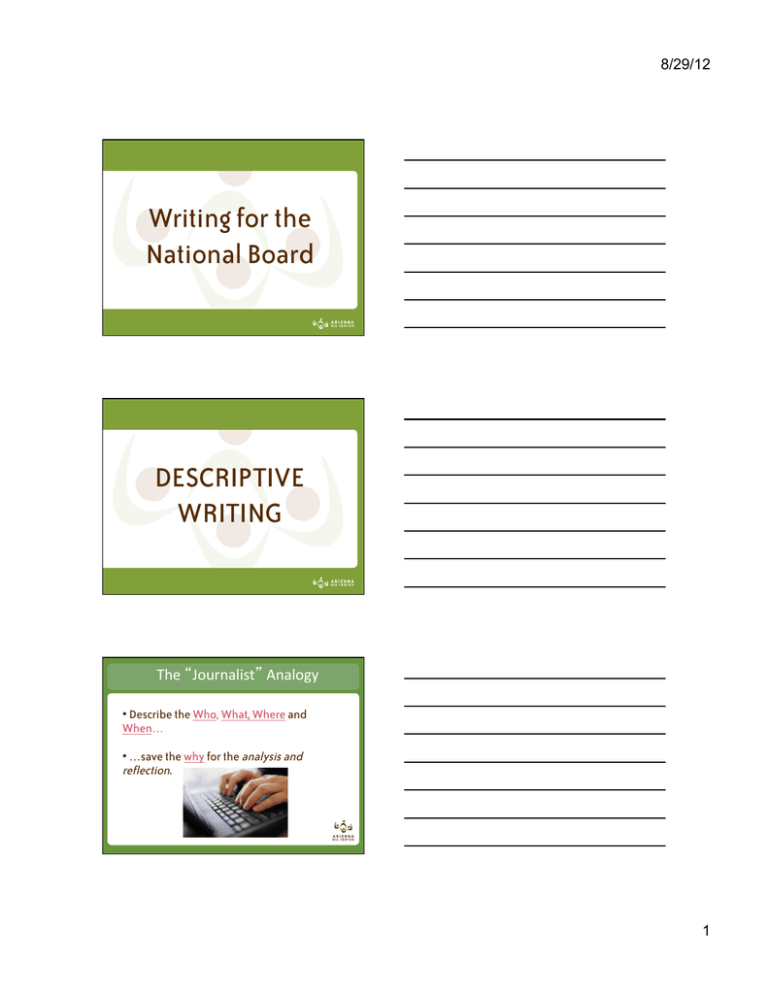
8/29/12 Writing for the National Board 1 DESCRIPTIVE WRITING 2 The “Journalist” Analogy • Describe the Who, What, Where and When… • …save the why for the analysis and reflection. 3 1 8/29/12 Topics of Descriptive Writing • Ability levels • Ages • Interests • Cultural backgrounds • Information that enables the reader “see” your students 4 Descriptive Trigger Words • State • List • Describe • What • Which 5 Descrip:ve Wri:ng Quali:es • Accurate and clear • Clear and logical order of the elements or features of the event, person, concept or strategy described • Precise supporting elements that would allow an outsider to “see” whatever is described. 6 2 8/29/12 SELF-CHECK 7 Self-Check What is the purpose of Descriptive Writing? A) To tell why you are teaching the unit B) To rationalize your instructional choices based on your school circumstances and obstacles C) To prepare the reader for the lesson analysis D) To describe one particular student in your class 8 Self-Check What is the purpose of Descriptive Writing? C) To prepare the reader for the lesson analysis 9 3 8/29/12 Self-Check What elements should be included in Descriptive Writing? A) Instructional challenges B) Achievement levels C) Course Content D) All of the Above 10 Self-Check What elements should be included in Descriptive Writing? D) All of the Above 11 Self-Check Your writing must directly quote the standards. • True • False 12 4 8/29/12 Self-Check Your writing must directly quote the standards. • False 13 Tips Highlight the number of adjectives and active verbs. Choose only words that clearly, concisely, and accurately describe your class, setting, and situation. BE SELECTIVE! Paint a picture, but don’t get carried away with the paint! 14 Stop and Reflect Pause for just a moment to reflect on Descrip4ve Wri4ng. 15 5 8/29/12 ANALYTICAL WRITING 16 The “Scientist” Analogy • Form a hypotheses • Confirm or reject your findings • Analyze the facts based on what you know and understand about student learning 17 Analytical Writing Qualities • Have the subject of what is being analyzed available to your reader (ie. video, student work, evidence) and be sure it is described clearly in the prior descriptive piece. • Analysis is not descriptive, persuasive, history or fiction. 18 6 8/29/12 Should Reflect an Understanding of Your Students • • • • • • • Interests Abilities & Motivations Skills & Knowledge Family Circumstances Peer Relationships Values Cultural Context 19 Should Reflect the Architecture of Accomplished Teaching • Understanding students • SeGng high and worthwhile goals • Developing appropriate instruc:onal strategies • Determining success through appropriate assessments • An analysis of where you’ll go next in light of these assessments and these students… 20 Questions to ask yourself… • What did my students know before this teaching experience? • What did my students learn as a result of this teaching experience? • What did I know about my students and their knowledge before this teaching experience? • What did I learn about my students and my practice because of this teaching experience? 21 7 8/29/12 Not “I wish… I feel…” • The focus of the wri4ng is not on what happened, but why it happened. • “Analysis deals with reasons, mo:ves, evidence, and interpreta:ons.” 22 Use Analytical Writing when you’re asked to: • Explain why a particular teaching strategy was successful. • Develop a rationale. • Explain what a student’s performance suggests about your teaching. 23 SELF-CHECK 24 8 8/29/12 What is the purpose of Analytical Writing? A) To tell why B) To describe your school C) To prepare the reader for the lesson analysis D) To describe a student in your class 25 What is the purpose of Analytical Writing? A) To tell why 26 When asked to analyze, it is my job to convince the assessors that my instruc:onal decisions were valid. • True • False 27 9 8/29/12 When asked to analyze, it is my job to convince the assessors that my instruc:onal decisions were valid. • True 28 Stop and Reflect Pause for just a moment to reflect on Analytical Writing . 29 REFLECTIVE WRITING 30 10 8/29/12 Questions to ask yourself… • Were the goals appropriate for these par:cular students in this par:cular seGng? • Did I design appropriate strategies, designate appropriate groupings, and gather appropriate materials? 31 More questions to ask… • How did the students perform in light of the chosen goals? • Could I have taken this a step further and increased student learning? 32 The “Doctor/Patient” Analogy • Describe your ailments • Doctor diagnosis in light of what he knows about medicine • A course of action is set to make things better 33 11 8/29/12 What’s my next move? • “Reflec4on is self-­‐analysis, or • considera4on of prac4ce.” • The focus is on why it happened and how it affects future instruc:on. 34 Reflective Writing is called for when asked to consider… • • • Successes, obstacles, and what you would do differently next time. Your reasons for making your decisions. Excuses for why things did or didn’t work they way you wanted. 35 Stop and Reflect Pause for just a moment to reflect on Reflective Writing . 36 12 8/29/12 Always Remember… The quality of evidence is more important than the quality of writing. 37 13
